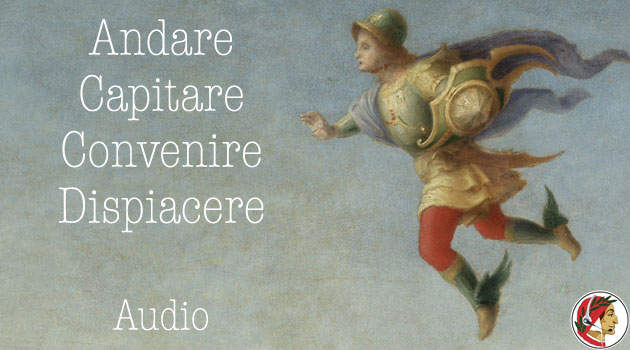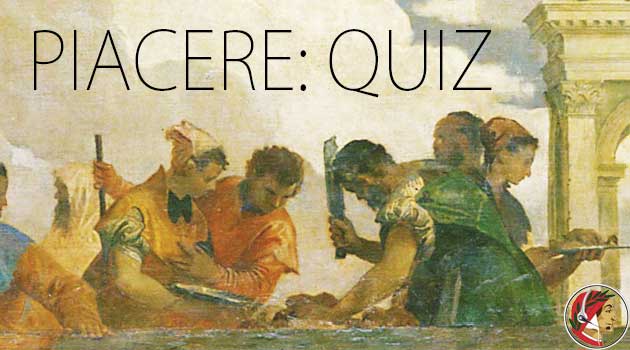There are some Italian verbs and set phrases that sometimes have no clear subject. The verbs andare, capitare, convenire, dispiacere
We know that the subject in sentences with the verbs piacere, bastare, interessare, servire etc. may look like the object, could be a verb or even another sentence. For example:
- Mi interessano i libri di storia.
- Vi servirebbe studiare di più.
The subjects are not respectively io and tu, but the underlined parts.
Today we’ll take a closer look at other verbs with a confusing subject. Some work with indirect object pronouns, same as piacere, while others are just impersonal. Please read the examples and listen to the correct pronunciation. Your job will be to understand the structure and the meaning of the sentences. I’m not going to translate them.
We can do that together during our Skype class, if there are doubts. If you are new, you can book a trial class at the bottom of this page.
Andare
I know, andare is a verb you wouldn’t expect to see in this post. However, when andare is combined with indirect pronouns (mi, ti, gli, le, ci, vi) it means “to feel like” or “to be eager to”.
If we add “male” / “bene”, or expressions as “andare a genio”, “andare a pennello”, “andare di traverso” the meaning is less intuitive. Try to guess.
- Ti andrebbe di andare al mare?
- Stefano è stanco. Non gli va di uscire.
- Sono a dieta, non mi vanno le patate.
- L’albergo vicino alla stazione ci va benissimo.
- Ho comprato un biglietto della lotteria, ma ovviamente mi è andata male.
- Il nuovo fidanzato di mia figlia non mi va a genio.
- La camicia nuova ti va proprio a pennello.
- Oggi Maria è disperata. Le va tutto di traverso.
Capito? If not, let’s talk about that in class.
Capitare
There’s a substantial difference between capitare and succedere, as “to happen”. Capitare always happens by chance, unpredictably. In English and Italian, something happens “to you, to him, to her…” etcetera, so we have to use an indirect pronoun, or simply “it happens”, capita or capitano.
There are also set-phrases with capitare, some with a clear subject.
- Non mi era mai capitato di trovare lavoro così facilmente
- Purtroppo è capitata una disgrazia
- Se capitasse a voi, non sapreste come comportarvi.
- Avevo bisogno di una mano. Capiti proprio a fagiolo!
- Se capitate da queste parti, fatevi sentire. Vi aspetto.
- Non ti devi vergognare, capita a tutti di sbagliare.
- Se Mario mi capita a tiro, gliela faccio pagare.
Convenire
It’s really tempting to translate this as to convene. Although this may be correct in Italian, we don’t use it often with the meaning of “come together”. It could also mean “to agree”, but it’s very formal, unusual in spoken Italian.
The correct translation of convenire is to be convenient, appropriate, useful, worthwhile. Together with indirect pronouns, it means “I’d better …”. Mi conviene andare, I’d better go. Very informal, and common in the spoken language.
- Non ti conviene fare il furbo. Ti conosciamo.
- Ci conviene andare prima che faccia buio.
- A questo punto, penso convenga prendere un taxi piuttosto che i mezzi.
Dispiacere
If you are new to the Italian language, you may think that dispiacere means “to dislike”.
Your assumption wouldn’t be wrong in negative sentences. “I don’t dislike it”, non mi dispiace is correct. We use this double negative to mean exactly what it says, that something “is not too bad”.
In a common sentence though, “mi dispiace” just means that I’m sorry.
The last three examples of our list are more idiomatic.
- Ci è dispiaciuto molto quando ve ne siete andati.
- Gli dispiacerebbe sicuramente se non trovassimo i biglietti.
- Mi dispiace, avevo dimenticato il nostro appuntamento.
- Mi dispiace da morire non averti incontrata a Natale.
- Le dispiace se mi siedo di fianco a Lei?
- Dispiace sempre quando la tua squadra perde.
Alla prossima.
[contact-form-7 id=”15171″ title=”trial due colonne”]
Piero di Cosimo: ” Perseo libera Andromeda” – 1510-1515 – Uffizi, Firenze








